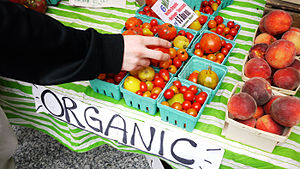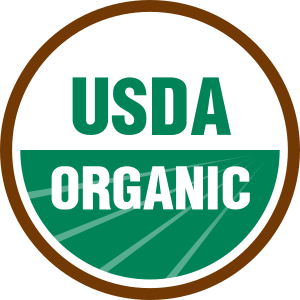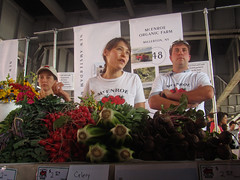Guest Post by Grace Simpson.
It seems like everyone is talking about organic foods like it’s some kind of buzz word or status symbol. I suppose for some, it might be. But for many of us, it’s a way of life that takes us back to a more natural way of living and farming. One that has been destroyed by the machine food production has become today.
Now, I don’t mean to sound like one of those doom and gloom, anti-establishment types. I don’t disparage anyone for choosing the foods that they do. Sometimes it’s an economic necessity. Other times it’s simply not having enough information about what’s really going on with our food. Sometimes it’s just apathy.
“Science may have found a cure for most evils; but we have found no remedy for the worst of them all, the apathy of human beings.”
~ Helen Keller
I’m not sure what I can do about the apathetic, but for people like you who may have budgeting obstacles or are trying to find more information about what’s going into your bodies, I am here to help.
So the first natural question is…
Why go organic?
Organic eating has a number of benefits and here are just a few of them:
|
|
| Organic certification (Photo credit: Wikipedia) |
1. Organic produce is free of chemical pesticides and fertilizers. Even if you wash your produce, you cannot remove all these harmful chemicals that can affect your nervous system, cause cancer and more. Also consider that conventional farming which uses harmful chemicals can contribute to the contamination of our water supply, so by supporting organic growers, you are also supporting a cleaner water supply for all.
2. While some people may not be quite as concerned,
eating organic can help you avoid foods that have been irradiated. Government bodies tout the irradiation process as helpful in reducing harmful bacteria, preventing spoilage and increasing shelf life of foods. However, irradiation reduces the nutritional value of your foods and there is growing concern by researchers that the process may not be as safe as previously thought.
3. Avoidance of genetically modified foods or GMOs (genetically modified organisms). While huge biotechnology companies like Monstanto will have you believing that they are increasing the viability of crop growing, there are long-term dangers in GMOs that have caused them to be banned by much of Europe and Japan.
4. Organic livestock is fed its natural diet, rather than potentially contaminated grains, antibiotics and hormones. This is in contrast to conventionally-raised livestock that get hormones to help them grow faster and antibiotics are given en masse as a preventative measure to illness. The scary thing is that this preventative measure may be necessary given the poor hygienic conditions of the animals. Organically grown animals are raised more humanely and more naturally, eliminating the need for these potentially dangerous situations for both livestock and humans.
5.
Organic growing contributes to improved soil quality. A lot of people don’t realize it, but our soils are so depleted that we no longer get the nutrients we did from our foods a few decades ago. In order to obtain the certified organic label from the USDA, soil must be free of prohibited chemicals for three years and the increased soil quality is a necessary goal for organic farmers. (To learn more about a variety of soil studies, check out
http://www.ota.com/organic/benefits/soil.html )
6. Organic farming is more wildlife friendly. From animals to plant species, a more natural ecology is supported through organic methods. There are many studies supporting this including a study from the University of Oxford that found that there is increased biodiversity on organically farmed land.
|
|
| Eco symbol used to promote organic, locally grown food (Photo credit: Wikipedia) |
7. Buying organic allows you to support your local economy and farmers. This is good for you because you get fresher (and therefore more nutritious and tasty) foods, and it also reduces the pollution that results from food transport. (Here's a
short video on why to eat local.)
There are so many reasons to go organic and this post touches on just a few of them. But here’s the most immediate one that just about everyone can really appreciate.
8. Organic foods simply taste better. This is real food, free of all unnecessary human interventions and inventions. It’s nature’s perfection and once you try it, you probably won’t want to go back to your other options.
Of course, this still leaves the issue of cost and how organic food can seem unaffordable to many families today. Well, that is exactly what we’ll be talking about in my next post....
Related Resources:











